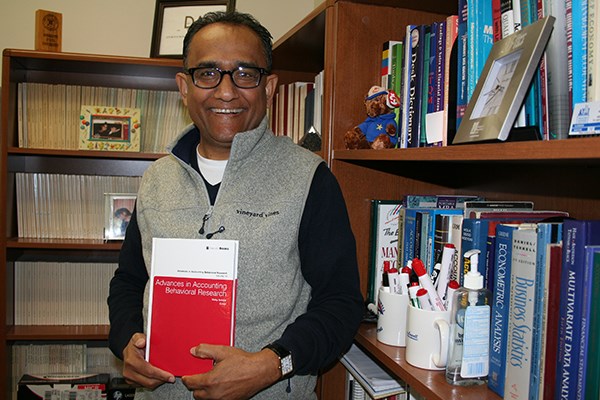Accounting Chair Takes on Research Journal Editorship

11/05/2015
By Ed Brennen
The way Prof. Khondkar Karim sees it, an accountant is like a handyman.
“We have a toolbox filled with various theories,” says Karim, chair of the Accounting Department in the Manning School of Business. “After a while some of those theories turn out to be obsolete, so we throw them out and add new theories to our toolbox to stay current with the economic trends.”
In his new role as editor of the international academic journal “Advances in Accounting Behavioral Research,” Karim will be working with enough theories to fill a hardware store, never mind a toolbox.
“People are always trying to come up with interesting, innovative and eye-opening ideas about accounting because they want to add an incremental layer on the existing body of knowledge, and that’s what makes it so interesting,” Karim says.
Published out of the United Kingdom by Emerald Group Publishing, the annual AABR journal promotes research across all areas of accounting by delving into the fields of applied psychology, sociology, management science, ethics and economics.
Karim, who joined the Manning School faculty in 2011 after 11 years at the Rochester Institute of Technology, has published more than 60 articles in various journals, including two in the AABR, and served on several editorial boards.
“I enjoy the editorial side, absolutely, but research is my passion,” says Karim, whose primary research focuses on archival (observing and analyzing secondary data) and behavioral (or experimental) methodologies, the latter of which he says helped him land the three-year editorship.
Karim understands that to the uninitiated, the accounting world may seem like little more than “bookkeeping and counting money.”
“That’s absolutely wrong,” he says. “Accounting itself is a sociology — a sociology of the investors, of the managers and of the regulators. The regulators come up with all these regulations for financial reporting practices, like the Dodd-Frank Act, and as managers, we take the regulation and try to incorporate it in the disclosure behavior. Investors are then reacting to your information.”
He has already received three papers for consideration, including one that uses neuroscience to track and analyze people’s eye movements as they read income disclosure statements in annual reports.
“Now I get to look at the big picture because all the behavioral researchers from all over the world are sending their papers to me,” says Karim, who first reads the manuscripts (which are submitted blindly without the authors’ names) before sending them on to one of six volunteer associate editors for review.
“The selection of the referee is very, very important because that can make or break the paper,” says Karim, who notes that the journal’s acceptance rate is around 25 percent.
Expanding his professional network and increasing the visibility of the Manning School are the two biggest gains Karim anticipates from his new role as AABR editor.
“This is an exciting time for the Accounting Department,” says Karim, who points to the Big Four accounting firms’ first-ever visit to campus this fall, along with the success of the graduate programs and the diversification of the Accounting Advisory Board, as prime examples of the department’s growth.
“Whatever good things we do,” Karim says, “is not only for us, but also for the institution.”
